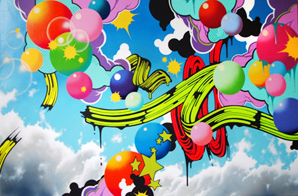
Overture to Tannhäuser – Richard Wagner
Perhaps it was January 1974. This was when Major Horst Mohn of the German SS, memorably played by Anthony Valentine, arrived in Colditz Castle at the beginning of series 2 of the BBCtv WW2 drama Colditz, and had a showdown scene with the Kommandant, the more sympathetic German officer in charge of the POW camp, played brilliantly by Bernard Hepton.
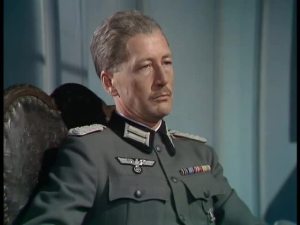
Bernard Hepton – the Kommandant – listens to Wagner
Mohn was sent down from Hitler’s inner circle, wounded in action, to Colditz. Things were going to get a little tougher for those plucky POWs, and for The Kommandant himself !
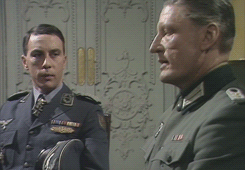
Anthony Valentine and Hans Meyer in spooky moving picture from Coldtiz
But to be honest, I can’t really remember the trigger scene. What I can remember is that my Mum wrote to the BBC and asked them – what was the music playing behind that scene ? If indeed that was the scene. And bless them – they replied : it was the Overture to Wagner’s Opera Tannhäuser. She went out to Eastbourne on the next shopping Saturday (record-buying day) and found an LP with the music. “Here’s that music” she triumphantly announced, “from Colditz. It’s Tannhowzer!”
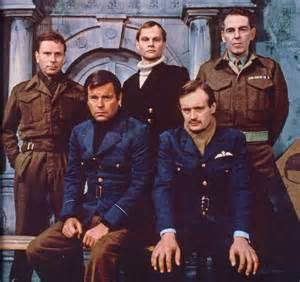
Those plucky POWS included Robert Wagner (a relation?) and David MacCullum
Had we even heard of Richard Wagner? Well we had now. The LP became an institution in our house. We lived in Hailsham East Sussex in 1974 , and we had very few LPs. Loads of singles – on labels like Deram, RAK, Tamla Motown, A&M, Parlaphone, Island, RCA, Track, Regal Zonophone, UA, Decca, Pye, MAM, Capitol, Chrysalis and others, but LPs – let me think – we had the soundtracks to Oliver! and The Sound Of Music, The Beach Boys 20 Golden Greats, In Search Of The Lost Chord by The Moody Blues, a Seekers LP called Morningtown Ride, Andy Williams, I had a bunch of stuff upstairs by then : Imagine, Roxy Music, Aladdin Sane, Band On The Run, These Foolish Things, VDGG, Electric Landlady and Abbey Road. Mum must’ve had some others, but not many. So the arrival of a new LP was a moment. We played it a lot. I know this music backwards, I know all the violin parts, all the horn parts, I know when it trembles, when it swells, when it swoons, when it thunders, when the percussion come in, when it fades – it is undoubtedly the piece of classical music I know best.
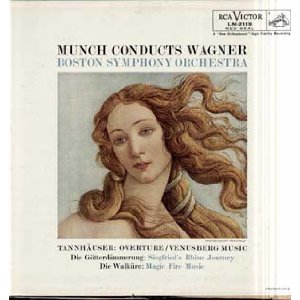
The legendary Tannhäuser LP cover
I knew nothing about Wagner in 1974, I was 16 and didn’t know much about anything. We all loved Colditz though and watched it together, and Mum writing to the BBC didn’t seem weird at all. Looking back, I’ve got to say that she had a very good ear, picking up on the background music to a scene in a BBC drama. Impressive. And suddenly we had this LP in the house. It’s a massively powerful piece of music, rich and dark and beautiful. We none of us knew that it was the Overture to an opera. I’ve still never heard the opera. Not sure I want to really. Since 1974 I’ve collected a fair bit of Wagner as he is one of my favourite composers – up to a point.
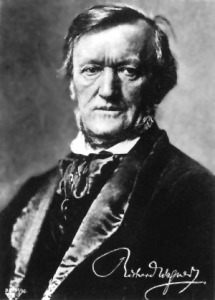
The Ring Cycle – four operas all telling a long story about Wotan, Seigfried, The Rhine Maidens and some ring or other – is one of the pinnacles of human artistic endeavour, but the problem is, I can’t really take the singing. I’ve seen one of the Ring operas – Götterdämmerung at the Royal Opera House in Covent Garden with Bernard Haitink conducting – one of the great interpreters of Wagner. I recognised much of the music because I have had a double LP (and CD) of Ring music for years – but there’s no singing at all on that LP, just the overtures and preludes. Just the music!!! Fantastic. The singing is so dull and tedious. My brother Andrew has been to see the entire Ring Cycle three times already, I couldn’t sit through it. Or could I? It’s almost worth it for the music which is outstanding. But No, give me the overtures anytime : Lohengrin, Parsifal, The Flying Dutchman, Tristan & Isolde, The Master-Singers of Nuremburg and the Ring – Rheingold, The Valkries, Seigfried and Götterdammerung. It’s 20 pieces of music in all. About two from each. And that’s all you need from Wagner. Sorry purists. But having said that – each piece is a magical journey into sound, music that opens you up and tears you down, music that rolls and rides and lifts and inspires. Fantastic stuff.

On the B-side of Tannhäuser were two shorter pieces : Seigfried’s Rhine Journey and The Magic Fire Music, both from The Ring Cycle. They hardly got played, but now and again they got an airing. No, Tannhäuser was the one. The umlaut (two dots) above the ‘a’ changes the pronunciation in a very efficient and clear German way – Tann Howzer becomes Tann Hoyzer (see My Pop Life 78). Pointless for me to describe the music. I know little about the opera only that it is a struggle between sacred and profane love and there is a Venusberg section which involved the goddess herself – in fact Botticelli’s representation of Venus (on the half shell as Kurt Vonnegut would say) was on the cover of our LP. It’s very pop classical, big obvious shapes, repeated phrases, completely dramatic and very melodic indeed – this is music with Tunes in. It also ripples in a particular way that appealed to later composers such as Claude Debussy (see My Pop Life 87). The rippling is fantastically effective in the Rhine music of The Ring operas, and in particular the opening of Das Rheingeld – a single Eb (E flat) chord which is slowly developed and teased out in a brilliantly simple yet effective musical impression of water. This piece of music is used by director Terrence Malick for the start of his film The New Age when the europeans ships first drop anchor off the Virginia shore in 1504.

But here’s one interesting thing about classical music, pop fans. It is written down, with a few guidelines about tempo written above the dots. In Italian. All music instructions are written in Italian, because it was during the Renaissance when written music began to be reproduced and thus instructions were key to how it would be performed. In fact many musical terms are Italian : opera, concerto, oratorio, soprano, alto, contralto, allegro, andante, adagio etc etc. Classical scholars reading – please advise me if I’m wrong here – but Richard Wagner wrote andante maestoso above the opening of Tannhäuser – a stately walk. Now – one woman’s stately walk is another man’s wandering stroll – or in other words it is hugely open to interpretation. This is what conductors are paid for, to read the Italian words on the top of the dots. So skimming though all the versions of this Overture on Youtube one finds ‘long versions’ – slower tempo, very stately – and shorter versions – pick up your feet a bit, violins. Conductor Daniel Barenboim gets through it in 14 minutes 37 seconds while John Barbirolli conducting the Hallé stretches it out to 25 minutes. I find this fascinating, this huge difference in style on one piece of music. It’s the same number of notes after all. In my experience, the piece you hear first and get to love – with any classical music – is the tempo that you prefer. I wonder if Wagner is harder to play at a slow tempo, harder to get it right? At any rate – the Charles Munch Boston Symphony Orchestra LP we owned clocked in at 21.12 and I just listened to it again, it’s perfect. If you’re just starting on Wagner though, I’d recommend two conductors who get the stately walk thing brilliantly – Herbert Von Karajan and Bernard Haitink. There is a lot of emotion in their approach, which I think is right.
Wagner completed the writing of Tannhäuser in 1845. The Paris opening was infamously interrupted by The Jockey Club for 15 minutes at a time amid chaotic scenes and Wagner withdrew the opera after three performances and never really established himself in France as a result. By all accounts he was an anti-semite, a misogynist and a bully, but as with our dear Kanye West and Michael Jackson I do believe that we have to listen to the music rather than read the tabloids. The music is magnificent, the man less so. It’s an age-old argument, but my position is simple : I don’t need to approve of Wagner to like his music. Another faux-objection to Wagner is the well-known fact that he was one of Hitler’s favourite composers which the BBC clearly played on when including his music in Colditz. But as someone said on Twitter the other day, Hitler liked dogs too. What of it?

So I am once again grateful to my mother Heather for opening my ears to music. Her ears are always open to tunes in the air, on the radio, behind the scenes. I’ve definitely inherited this from her. I could have gone on to study music if my teachers at Lewes Priory weren’t so incredibly dead. But I am where I am. Music is freely available to us all whatever our profession, and it remains the delight of my life. This particular piece of music just makes me feel good. I don’t really need any further recommendation than that.